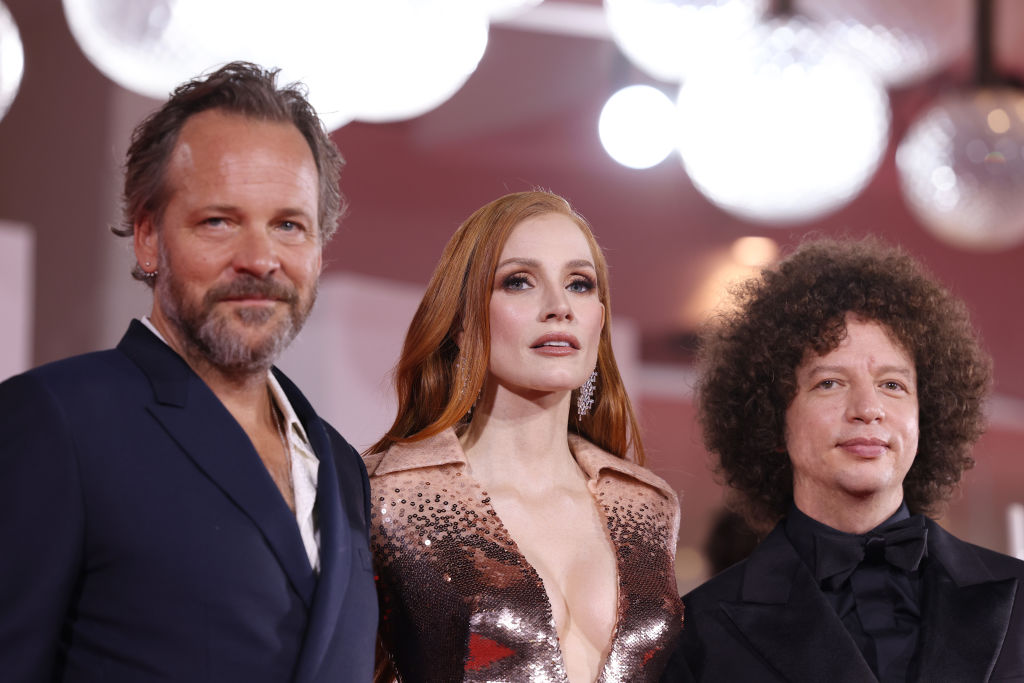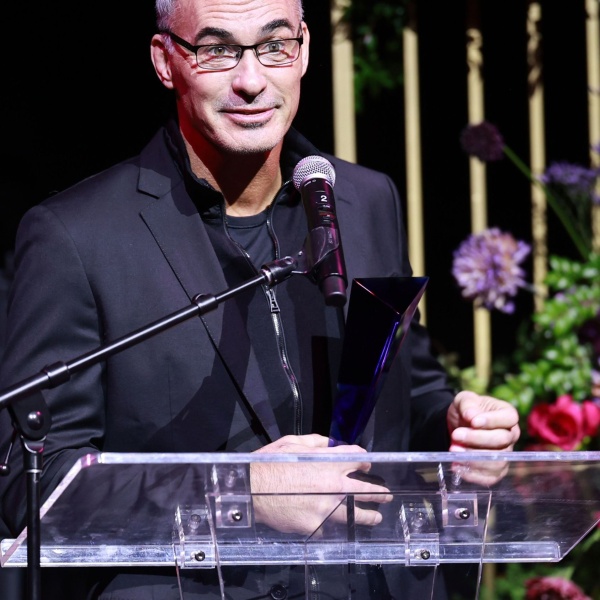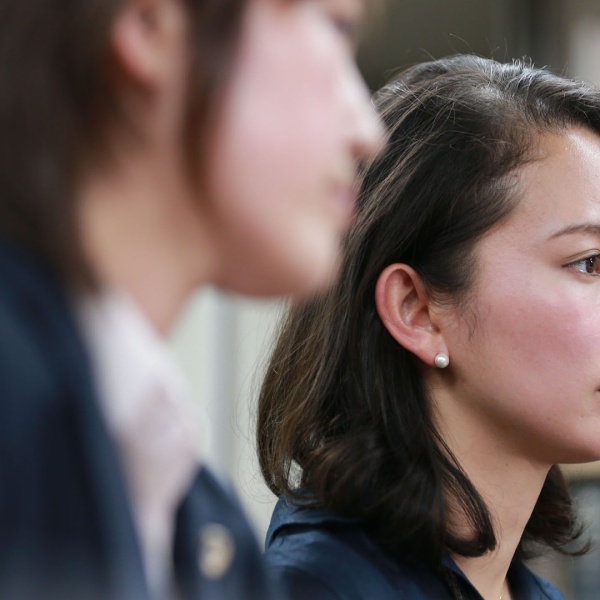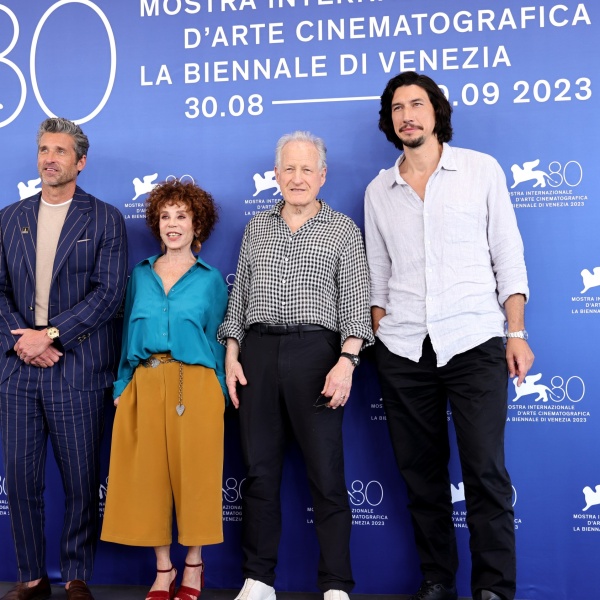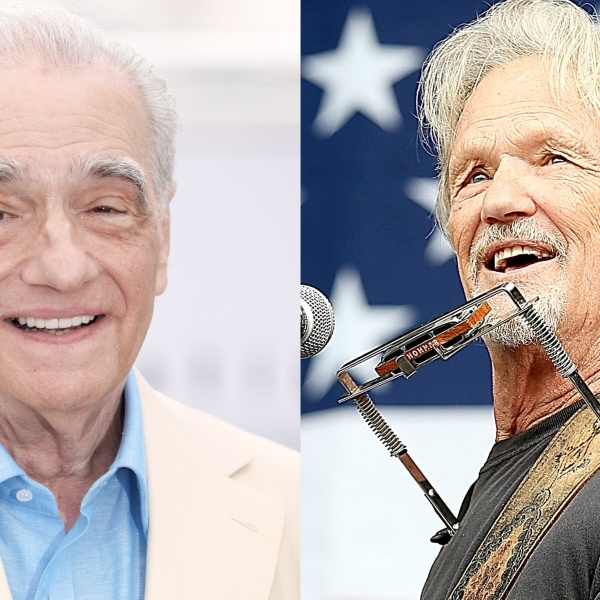In her latest film “Memory,” Jessica Chastain is out of the prosthetics and wigs and off the awards circuit (for now) required by playing two Tammys — Wynette and Faye Bakker — for Showtime’s “George & Tammy” and her Oscar-winning “Eyes of Tammy Faye.”
To play Sylvia, a recovering alcoholic grappling with childhood trauma for Michel Franco’s devastating Venice and Toronto premiere “Memory,” the Oscar winner and Emmy nominee wears no makeup, had no trailer, and bought her own costumes for the indie’s New York shoot.
“Because I have been doing bigger things sometimes and have gotten a lot of attention as of late, [there’s been the idea] that I would not be interested in being on a set without a trailer,” Chastain said in an interview out of Toronto. “We had the Oscars, and I won for ‘Tammy Faye,’ and then right after that, I showed up on set to do ‘Memory.’ Michel said that a lot of people told him, ‘Oh Jessica is going to leave your film because she just won an Oscar.’”
“Or that she is going to show up and be a nightmare and be a diva,” said Franco, working with his most high-profile cast so far, including Venice Best Actor winner Peter Sarsgaard. “I told them, you don’t know half of it. She’s the opposite. She’s going to show up satisfied, happy, and be productive. People are so afraid of actors. I don’t know why. The worst way to approach an actor or any person is with fear, and if you are pointing in the wrong direction then, yes, all your nightmares will come true.”
Franco said his stakeholders were skeptical. “They were all puzzled. Like what are we going to do with this Oscar-winning actress?” But no matter, as the drama is now hotly acclaimed — and able to promote itself with cast at hand thanks to a SAG-AFTRA interim agreement and a tiny New York production without AMPTP involvement.
“I’m not doing a movie to be pampered. If I want to be pampered, I’ll go to a spa. I’m doing a film to work and to be creative, and I don’t need to sit by myself in a trailer,” Chastain said.
Sarsgaard co-stars in “Memory” — the most empathetic portrait of broken people yet from the Mexican director of cold provocations like “New Order” and “Chronic” — as a sketchy-seeming former high school classmate of Sylvia’s who follows her home after a reunion. As the pair of damaged goods grow closer, we learn Saul also has dementia and lives under the care of his brother (Josh Charles) and niece (Elsie Fisher). The constantly and unpredictably refreshing slate of Saul’s psyche makes it easier for the troubled Sylvia to connect with him — but not after trying to exploit his memory impairment by falsely scapegoating him for her high school-aged abuse. People do complicated things when they’re numbing their pain.
“By meeting someone who doesn’t have a connection to the past, she’s able to free herself from her past, and she’s able to start again in each day and each moment to discover who she is again,” Chastain said.
Already, Franco and Chastain have shot another movie entirely, the San Francisco-set “Dreams” (as first reported by Deadline), a drama made for $3 million with a non-WGA script. Teorema and Chastain’s Freckle Films reportedly employed some 60 actors and 50 below-the-line crew for “Dreams,” made under a SAG-AFTRA interim agreement and under the secrecy equivalent to “Memory’s” own. (Until the film’s first Venice screening, no one knew anything about what “Memory” really was.)
Chastain, Sarsgaard, and Franco sat down with IndieWire to discuss the film’s loose-handed production style, its complex post-MeToo themes, batting paparazzi off the set, and the tricky scene that almost compelled Chastain to reject the script — until she kept reading.
This interview has been condensed for clarity and length.
IndieWire: “Memory” feels like the aftermath of a Michel Franco movie. The other shoe never drops, the damage has been done offscreen, and now we are left with the reckoning of that trauma. There’s an early scene where Sylvia accuses the memory-impaired Saul of being her childhood abuser, and for a minute you think, “OK, this is going to be a twisted Franco joint after all.” But then the movie unfolds into something more unpredictable and tender.
Michel Franco: I never analyze, I don’t do career moves, like ‘I want to show the audience that I have a different side.’ I just do what I have to do, and it’s true, that scene you’re pointing out is the key point in the film where it could have gone in one direction or the next. Jessica can tell you about her experience reading the script. She was pretty much ready to put the script down when that scene showed up, and it seemed predictable where it was going to go. Creatively, I decided to challenge myself in a different direction, but more than that I was in a moment of my life where I felt peaceful somehow. That doesn’t mean that when I sit and write “New Order” I’m in the middle of the opposite, of chaos in my life.
Jessica Chastain: We’d just come out of the pandemic and the MeToo movement. As I was reading it [in 2021], I thought, “This is a version of a dark revenge thriller where this woman who has been abused now inflicts abuse on others.” So I just felt this is probably where it’s going to go, and as I turned each page, I was pleasantly surprised that it was a script really devoid of any kind of cliché. What I really responded to was the empathy and the hope at the end. This is for me about two incredible human beings, but also playing Sylvia it was so much about how this woman has been calcified by life and is only really moving through the world using trauma as a shield to prevent anyone from getting close. By meeting someone who doesn’t have a connection to the past, she’s able to free herself from her past, and she’s able to start again in each day and each moment to discover who she is again.

Shooting this movie, there’s no makeup, there’s no trailer. But Jessica, it’s not like you’ve never been this unvarnished before. You started out in indies and theater.
Chastain: I said to Michel a lot actually, the way he shoots reminds me of Terrence Malick in that there’s no separation. Sometimes, in our film industry there’s a lot of “above the line” and “below the line,” and I find that all is bullshit on set, where it’s just all about separating people and not feeling like it’s an ensemble or a team and a collective group telling a story, led of course by the filmmaker. With Terrence Malick and Michel Franco, you definitely feel like you’re connected with others in a profound way. I come from theater, and that’s what I want. When we first started out in our first Zoom, Michel was a little nervous, he was like, “Do you understand the way I shoot? I don’t do makeup, I don’t do trailers.” And I said, “Yeah, I’m fine, let’s go.”
Franco: She was like, stop talking, I know what I am getting myself into.
Chastain: I’m not doing a movie to be pampered. If I want to be pampered, I’ll go to a spa. I’m doing a film to work and to be creative, and I don’t need to sit by myself in a trailer.
Jessica, you did your own hair and went shopping for Sylvia’s clothes at Target.
Chastain: I was in Nashville at the time, and I went to Target. We were moving quickly. I think I spent like $130 and I brought it back, and we did a fitting. Michel told me that our cinematographer Yves [Cape] goes, “She still looks too chic!” There was a lot of let’s try and just scrub Jessica of any kind of movie star feeling that we can, which also I appreciated. I appreciated that I was doing my own hair every day. It was fun.

Sarsgaard: For me, my grandparents had a trailer, and I lived with them, and I don’t feel any need to spend more time in a trailer. To me, it’s a community that makes something. I have a tremendous amount of difficulty doing it the other way, where some person calls me, “It’s time to come to set now,” and I come at the last minute, and all of that sort of thing. I lose track of the flow of what we’re doing. For me, this way of working makes it possible. My performance in the movie is possible because of the way we were interacting on set even though it was strange, because we are able to have those interactions. I would mostly just go stand outside where we were filming, I hate being inside.
Michel, how would you describe your way of working with actors?
Franco: Before I start directing, before costumes, wardrobe, I just tell them, “Show me what you will do with the scene.” They do that, then they go change, my cinematographer takes 10 minutes to get ready because he’s extremely fast, and then we shoot the same scene sometimes 10 times, sometimes 25 times. There’s no coverage, and then we move to the next. There’s no trailers or anything like that. The actors are always hanging with me, and we’re always talking about the scene, so we’re always busy, and that’s what these actors like. What they hate the most is to act very little on a long day. That’s the worst, I think. As long as that’s not happening, we’re all having fun and just shaping a scene, if we do it 25 times, it’s because it keeps getting better or we’re playing with it.
Sarsgaard: On big movies, sometimes you’ll be asked to recreate something from coverage you did the previous day. I have no memory. I feel like this is a performance-driven way of doing things. Every actor I know would want to be in this movie.
Chastain: The only reason I would sometimes go inside — because it is more fun hanging out with people you’re creating with — is if we had an issue with paparazzi. Sometimes we had that, but again with that, I would just walk over to them, and be like, “Please guys, please, please, you got your picture, could you leave us alone?”

Speaking of, you all kept the nature of this movie so secretive even while shooting last year all over New York. How did you do it?
Franco: I think like with any other thing in life, it’s better not to talk much about what you’re gonna do; you just do it. Also, we don’t know the movie we’re making until it’s done. There’s no studios or anything behind me, so I don’t have to bitch to anyone to explain anything. If the actors and I want to go crazy and change something, we don’t have to ask anyone what they think. We just do it.
[Also,] I would never do that thing where I don’t give actors a script. We don’t communicate to the outside world, but among us, we all work together. I’m not a puppeteer.
Sarsgaard: It’s as if actors, we’re children. I’ve had that happen to me before, and I’m like, well, if you want me to do the best job I can do, I’m also a storyteller, so you’ve just killed half of what I do.
Chastain: Michel doesn’t see actors as an obstacle. I’ve noticed in my career, there are some filmmakers who see actors as an obstacle to their film, and some who see them as collaborators, and I’m much more interested in working with a collaborative filmmaker.
Jessica, starring in “George & Tammy” and the film “Eyes of Tammy Faye” were huge undertakings with these massive awards campaigns, and you were doing one for the Showtime series while starring on Broadway in “A Doll’s House.” Did “Memory” happen out of desire to do something smaller?
Chastain: I’ve always had the desire to do something smaller and to work with filmmakers that lead with story and have their own unique point of view and don’t direct by committee. I find that frustrating when a filmmaker has 10 people, whether executives or what, directing with them. There’s been perhaps [this idea that] because I have been doing bigger things sometimes and have gotten a lot of attention as of late, I would not be interested in being on a set without a trailer. We had the Oscars, and I won for “Tammy Faye,” and then right after that, I showed up on set to do “Memory.” Michel said that a lot of people told him, “Oh, Jessica is going to leave your film because she just won an Oscar.”
Franco: Or that she is going to show up and be a nightmare and be a diva. I told them, “You don’t know half of it. She’s the opposite. She’s going to show up satisfied, happy, and be productive.” People are so afraid of actors. I don’t know why. The worst way to approach an actor or any person is with fear, and if you are pointing in the wrong direction then, yes, all your nightmares will come true. They were all puzzled. Like, “What are we going to do with this Oscar-winning actress?”
Chastain: While we were shooting, because we were shooting above a tire store and everything, it took me like a month to get the dirt out from under my fingernails. Where we were shooting in the subways, the tire shops, it was a part of New York I hadn’t experienced, but also I am grateful for that.
“Memory” will open exclusively in New York and Los Angeles on December 22 before its nationwide rollout on January 5 from Ketchup Entertainment.
